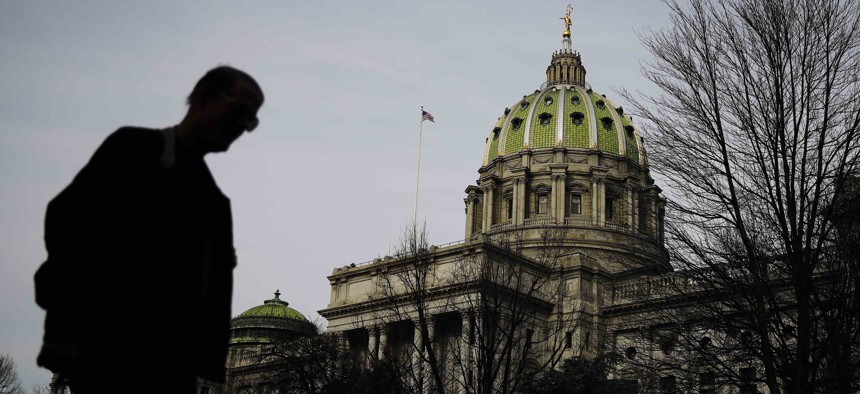State Bill Seeks to Clamp Down on Pension Benefits for Lawbreakers

The dome of the Pennsylvania Capitol is visible in Harrisburg, Pa. AP Photo/Matt Rourke

Connecting state and local government leaders
Pennsylvania Gov. Tom Wolf is expected to sign the legislation.
Pennsylvania's legislature has approved a bill that would strengthen a state law that strips politicians and public employees of retirement benefits after they're convicted of certain job-related crimes.
State Sen. John DiSanto, a Republican who represents a district covering areas in and around Harrisburg, is the bill's lead sponsor.
He says it's intended to close a loophole that allowed a former state senator to have his $245,000 a year pension restored, despite a guilty plea and serving prison time on federal conspiracy charges.
"It's obvious to me and all the honest, hardworking citizens of Pennsylvania, that lawbreakers violating the public trust should not receive lifetime pension benefits," DiSanto said in floor remarks.
The bill cleared the state's Senate in a 44-0 vote on Wednesday and a spokesperson for Gov. Tom Wolf, a Democrat, said Thursday that he plans to sign the measure. It passed the House on Tuesday 194-1.
Public employees and elected officials in Pennsylvania under current state law can have their pension benefits taken away from them if they're convicted of certain crimes related to their employment.
The statute allowing for this is the Public Employee Pension Forfeiture Act, some of the crimes it covers include offenses involving theft, extortion and forgery. DiSanto's bill adds language to the act so that it would apply to any criminal offense under state law that's classified as a felony, or punishable by a prison term over five years.
It would also amend the act so it applies to violations of laws in other states that mirror Pennsylvania offenses that trigger pension forfeitures. And it expands the law to cover certain federal felonies related to fraud and "swindles."
Additionally, the bill makes clear a person's benefits are cut off on the date they enter a guilty plea, or when they're found guilty in court.
While people convicted of crimes subject to the pension forfeiture law lose their benefits they are entitled to get back the pension contributions they made, without interest.
DiSanto described the bill as a "significant step forward for government reform" and said retirement boards over the past decade have identified "potentially hundreds" of cases where people plead guilty to felonies that do not require them to give up their benefits.
But an actuarial note attached to the legislation said it would likely pertain to only a limited number of people and would have minimal financial implications for the state's pension systems.
Pennsylvania's public school employee pension fund and its Employees' Retirement System are both underfunded. In fiscal 2017 each had shy of 60 percent of the funding needed to cover anticipated benefits payments in future years.
Bill Lucia is a Senior Reporter for Route Fifty and is based in Olympia, Washington.
NEXT STORY: Soda Taxes Lead Some to Cut Down on Sugary Drinks, Fizzle With Others





